#literary review
Text




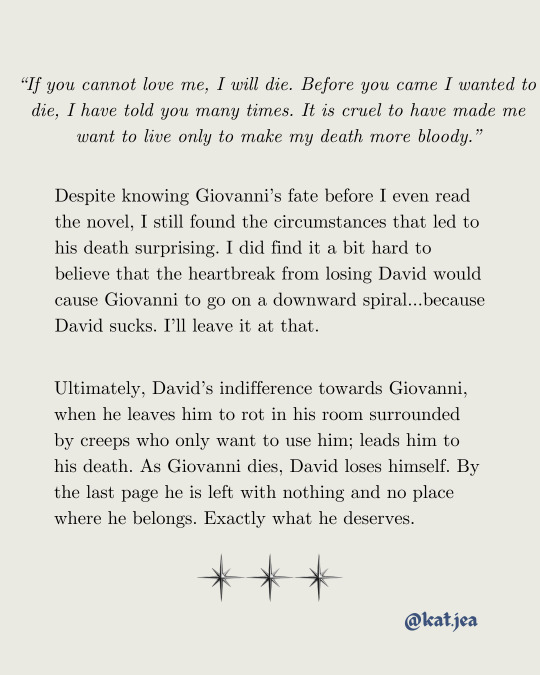
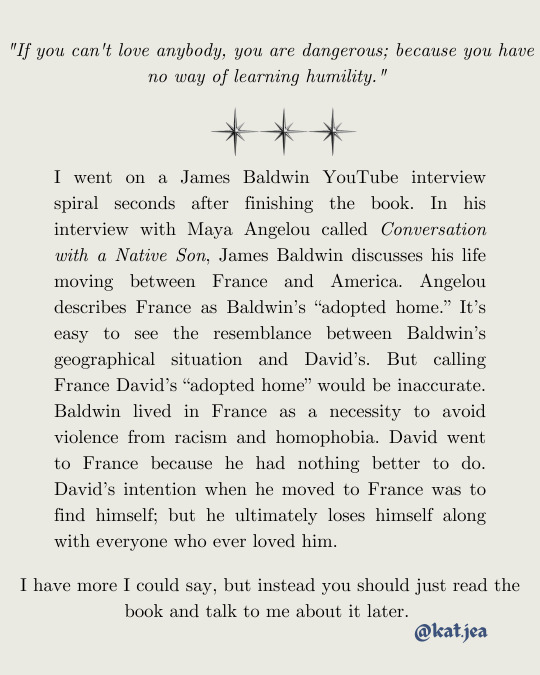
Read This Now! - Giovanni's Room by Katie Harrison | Chariot Edition / June-July 2023
I dream of Opal Age...
#zine#queer authors#James Baldwin#Giovannis Room#literature#lit mags#lit#literary review#booklr#bookblr#light academia#dark academia#chaotic academia#queer writers#writer community#writerscorner#women writers#writers on tumblr#open submissions#queer history#queer books#lgbt books#queer fiction#gay books#living abroad#opal age#i dream of opal age
5 notes
·
View notes
Text
24-09-22



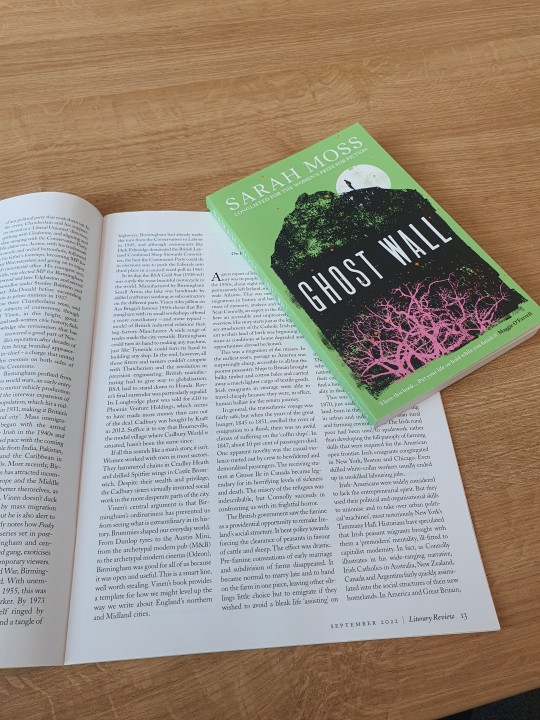
Today I checked out a study spot on campus and went into the city to do a food and book shop. I got the September Literary Review and Ghost Wall by Sarah Moss.
#studyblr#studyspo#new studyblr#studying#study motivation#ib#ib m22#uni#university student#university#gilmore girls studyspo#gilmore girls#literature#literary review#sarah moss#ghost wall sarah moss#study with me#trackanthroblr#studyblr tracking#studyblr community#deskspo#uni motivation#motivation#studyblr motivation#education#academia#dark academia#autumn aesthetic#autumn studyblr#autumn studyspo
11 notes
·
View notes
Text
The Enduring Legacy of The Lord of the Rings and Harry Potter: How Two Fantasy Epics Have Influenced Society
“He must have known I’d want to leave you.”“No, he must have known you would always want to come back.”― J.K. Rowling, Harry Potter and the Deathly Hallows
The Lord of the Rings and Harry Potter are two of the most beloved and influential works of fiction in modern history. Despite their differences in setting, tone, and themes, both series have had a significant impact on popular culture and…

View On WordPress
#epic poem#epic poetry#harry potter#heroism#history#juxtaposition#literary review#literary theme#literature#lord of the rings#read#trope
2 notes
·
View notes
Text
My Personal Book Review 16
Title: Long Live the Pumpkin Queen
Author: Shea Ernshaw
Genre(s): Fantasy, Halloween
Synopsis: "Sally Skellington is the official, newly-minted Pumpkin Queen after a whirlwind courtship with her true love, Jack, who Sally adores with every inch of her fabric seams -- if only she could say the same for her new role as Queen of Halloween Town. Cast into the spotlight and tasked with all sorts of queenly duties, Sally can't help but wonder if all she's done is trade her captivity under Dr. FInkelstein for a different--albeit gilded--cage. But when Sally and Zero accidentally uncover a long-hidden doorway to an ancient realm called Dream Town in the forest Hinterlands, she'll unknowingly set into motion a chain of sinister events that put her future as Pumpkin Queen, and the future of Halloween Town itself, into jeopardy. Can Sally discover what it means to be true to herself and save the town she's learned to call home, or will her future turn into her worst...well, nightmare"
Personal Rating: 10/10
Opinion: I absolutely loved this book! I thought the characters were great, the storyline was awesome, and I thought it connected to the movie pretty well. Admittedly, I was worried the book was going to alter the characters too much from the original film, but I am pleased to say I think that was avoided. Maybe some might say one character was altered, but I don't think so, plus I never really thought much of that character so whatever. My only real complaint is how short it was, at least to me, since I was able to finish it in 3 days, that includes the day I got the book. But that could just be due to combination of my love of reading and love of Nightmare Before Christmas related things. And of course, Sally was wonderful in this book, and I think the author did Sally a justice. I highly recommend it to anyone who loves The Nightmare Before Christmas or is wants to get into the Halloween Spirit! Perfect for Halloween!
#Personal Review#Nightmare Before Christmas#Book Review#Long Live the Pumpkin Queen#Shea Ernshaw#Literature#Literary Review#Fiction#The Nightmare Before Christmas
7 notes
·
View notes
Text
Review of “Recitatif”
Toni Morrison intricately manages to make race an absent element in a story where the latter is hugely valuable. “Recitatif” allows the reader to visualize the characters beyond race, while also forcing us to face our own biases by attributing traits to these characters based solely on what we know of and how we perceive them. Who’s black? Who’s white? No one has been able to answer these questions yet from what I found throughout my research, as Morrison makes it almost easy and impossible at the same time. Yet the beauty of this story doesn’t even lie in the greater message, it is in the little details. The way she achieves the confusion of the reader by carefully dropping hints throughout the dialogues and interactions between the two protagonists. Where one might link Roberta’s eccentric activism to blackness, and Twyla’s judgmental mind to whiteness, others might say it’s the opposite. The following paragraphs will be an attempt to find out what exactly is Morrison intervening for in this story?
She begins by giving us a look into their childhood where the racial ambiguity was not hugely present yet, and by having Roberta and Twyla both share an equal amount of space in the story. However, where the idea of race is not yet apparent within this part of the story, she heavily relies on the description of their mothers to give us an idea of what Twyla and Roberta might look like physically. Twyla’s mother “likes to dance all night” (244), which hints at the fact that she might be an exotic dancer. If we were to use this little detail to assign a color to Twyla, it could be said that this activity is partaken in by a lot of adult African American women, especially at this time when there was a still a lot of progress to be made when it came to inclusivity at the workplace, or even the lack of jobs available to black people in that time. Twyla’s mother could be a representation of an African American woman using her body as a source of income. This interpretation of course comes from personal biases, considering that Morrison merely uses descriptions such as “She had on those green slacks I hated and hated” (p.246) and language such as “That bitch” (p.246) to portray the mother without outwardly saying if she’s either black or white. Now, in an ideal world where these could be attributed to anyone, Morrison is perhaps consciously playing with the reader’s mind by introducing the mothers in a chapel, though one is more religious than the other, religion is inherently very important to both communities, and there are also people who do not care for it within both races as well. This just leaves the reader to figure out the answer by themselves.
Where Morrison is stingy on the details about their physical appearance, she makes up for with vivid imagery, and descriptions of food and environment. When the girls meet again a couple years later, she describes Roberta’s hair as “her own hair was so big and wild I could hardly see her face.” (p.249) Morrison keeps up with the same push and pull throughout. Where the reader must figure out whether to assign this physical feature to one specific race or not. And the answer is no, you can’t. Wild hair was common in the 90’s to, again, both communities. In this case, any other word would have made a much bigger difference. For example, “kinky” or “curly” or “wavy”, but “wild” refers to a broad idea of hair, which is not specific to any one race. But there’s also the stigma around textured hair on black people. One of the most interesting, but often unspoken rules amongst people of color (specifically black people) and white people is that the former group often repels the idea of their hair being touched by the latter group, because oftentimes the gesture is done in a very ignorant, and judgmental way. There’s also cultural appropriation, which is often misconstrued for cultural appreciation, and when black hairstyles are often judged on black people, and praised on white people. Therefore when it comes to Twyla sometimes pointing out how “the wrong people get the good stuff”, it could be assumed that she was in fact addressing this double standard. Which again will more than likely push the reader to picture the character as a black woman.
And obviously, the most interesting interaction between the two protagonists was their verbal fight during the protest, when both Twyla and Roberta are both faced with the revelation that they are now both completely different human beings. In this scene, Roberta’s activism could easily be attributed to a specific race, but again, Morrison tries very carefully to render the whole situation race free, and let the reader use their own biases to justify each character’s actions. The passiveness of Twyla might be interpreted as though she’s clueless about social movements, and is comfortable enough with how things are, and that type of passiveness is often attributed to white people, yet at the same time, Morrison pushes us back again with this short dialogue: when Roberta says to Twyla “I used to curl your hair”(p.257), and the latter responds “I hated your hands in my hair.”(p.257). This is probably the most straightforward detail we get from the whole story in my opinion. One that could lay all the speculations about race in this story to rest.
When Roberta says, “I used to curl your hair” (P.257) it sounds like she’s being defensive about basically being called a bigot by Twyla. Just as many people use the “I am not a racist, I have a black friend” excuse when they are being called out on certain situations. As if having curled Twyla’s hair somehow gives her pass to be ignorant Here, I believe Morrison is using their reactions to try and give us an idea of their race. That’s what makes this scene such an important part of the story, is that it is where the familiar push and pull from the author is done at its best. She starts off by making the reader think something but by the end, they’re thinking something else.
In Recitatif, Morrison not only allows the reader to see past race, but also she makes us conscious of our own biases, and realize how we might be able to perceive some actions and attribute to someone from a specific race. After making us think over all of our assumptions, she leaves us to imagine a world where race is not the basis of one human’s life, and should be far less significant than what society makes it out to be.
This work is my own, except for the work cited
4 notes
·
View notes
Text
‘What use is ruin?’ asks Emily Wilkes, protagonist of I’m Dying Laughing, the posthumous novel by the Australian Marxist author Christina Stead. ‘Communists should not be ruined: they should stay on top.’ Unfortunately for Emily, ruin is the abiding theme of Stead’s impressive and neglected oeuvre. Her last novel, left unfinished and assembled from drafts by her literary trustee after her death in 1983, occupied her for at least the final thirty years of her life. Its incompleteness is a testament to the difficulty of capturing the full ruinous extent of the lives of its characters: mid-century members of the American Communist Party.
Born in 1902, Stead was an Antipodean émigré whose best-known novel, The Man Who Loved Children (1940), thinly fictionalised her own Sydney childhood by transplanting it to Washington DC. In later years she moved between France, Spain, Belgium, England and America, supporting herself as a writer through an equally various list of occupations: banker, Hollywood screenwriter, journalist, tutor in the art of the novel at NYU. Despite the recent resurgence of interest in modernist women writers of the American left – Grace Paley, Adrienne Rich, Muriel Rukeyser – Stead still lingers in relative obscurity. Her decades-long neglect can be partially explained by the fact that no one has ever quite known where to place her. Though she insisted on her native national identity throughout her life, in 1967 she was given the Britannica Australia Award for literature and then subsequently denied it due to her long absence from the country. Her work is just as resistant to categorisation. Unlike Rukeyser, a totemic figure of lyric communism, Paley, whose work pointed to the potential for a coalition between writers and activists, or Rich, who reflected on the conditions of literary production under patriarchy, Stead’s dozen novels and numerous short stories stubbornly refuse to coalesce into a single political message. This, of course, is one of many reasons to read them.
Prima facie, I’m Dying Laughing is the story of Emily, a young, naïve journalist from rural Pennsylvania, fresh off the bus in Manhattan, who finds fame and unhappy fortune as a comic writer specialising in homespun tales of the ‘Mrs Blueberry Pie’, ‘Arkansas peasant’ and ‘Freckles’ variety. Unlike Letty Fox and Her Luck (1946), another of the quintet of Stead’s American works, the political mêlée of the Lower East Side in the 1930s and 40s is but one location among many in the book. Emily and her disinherited millionaire husband Stephen Howard ricochet first across the continent, then over the Atlantic to exile in post-war Paris. In each new domicile, they stage a carnival of ever-more-conspicuous consumption, funded by cheques from Emily’s writing career, first for the workers’ dailies, then Broadway, then Hollywood, then magazine syndication and the bids of the highest paying publisher.
Between fixtures, fittings, curtains, cocktails, lobsters (thermidored and souffléd), bread rolls, gateaux and expanding garters, the Howards discuss politics, the plight of the worker, the disappointment of the New Deal, the parasitism of the intellectual, the laziness of their servants, the fortunes of their children and their own mounting debts. When will Stephen gain the respect of his peers as a Marxist historian and theoretician, or Emily acquire the focus needed to become the next Theodore Dreiser? After the next bestseller, the next soirée, the next relocation, they declare. On and on they chatter and fret until they are consumed by madness, ultimately reneging and naming Party names. The final act of their bourgeois marriage is the pathetic renunciation of their friends to the CIA in the service of renewing Emily’s American passport.
Emily suffers from acute logorrhoea: in Stephen’s words, ‘this chronic verbal excitement which arises apropos almost of the feeblest immediate cause.’ Her loquaciousness is characteristic of Stead’s approach to dialogue, a tool which replaces plot as much as driving it forward in many of her later books. As the novel progresses, Emily’s reliance on luxury increases in proportion to her inability to produce the work which funds her lifestyle. Emily wants to be everything at once: her adopted son’s mother and his lover, a Hollywood success, a writer of literary Marxist works, a slim gourmand; she wants to speak French fluently but can’t stop speaking American English for long enough to learn. She sees herself as a New Yorker, a hick, a ruined millionairess, a made worker.
Money, the need of it, the failure to keep hold of it, runs like a seam through the Howards’ marriage, as Emily’s talent is wrung for every cent it’s worth and then mortgaged out for more. In her figure we see the comic potential of an idea of socialism based on the fulfilment of personal needs: demand everything at once, then have no idea what to do with it once it’s yours. Reconciliation with meaningful work, a political position, a sense of agency and purpose requires decision-making powers – and these are powers Emily does not possess. What’s more, she lives in an age of impossible decisions. The CPUSA, whose orderly arrangement of human history and direction of its necessary future has structured her and Stephen’s entire adult life, has turned against them after their criticism of the wartime policy of a united front. For a while, the couple tries to maintain their faith outside the institution, but what use is a member without a party? These contradictions catch up with the Howards. Their rejection by the European communists and the growing irreconcilability of their political views with their addiction to finery create a fatal gap between their public personae and their private desires, which Emily tries frantically to fill with more of everything: writing, eating, loving. ‘Well of course,’ as Stead said of the couple, ‘it came to a bad end.’
Observing her topsy-turvy bacchanal of unsatiated impulses, it’s tempting to compare Emily to a Shakespearean fool – more Falstaff than Hal, as protagonists go – but her knack is for the comedy of incongruity. When she bemoans to Stephen the fact that ‘the masterpieces of the world are gloomy – tragedies no less’, he assures her that she’s ‘a funny Hamlet’. But it’s another incongruous fool of Shakespeare’s that makes the best parallel for Emily Wilkes. In Act III Scene I of Titus Andronicus, after being tricked into cutting off his hand in ransom for his dead son, the titular lead speaks the singular line, ‘Ha, ha, ha!’ Titus’s laughter is neither genuine nor spontaneous; it is a deliberate response to a world he no longer understands. He is laughing no more than Emily is when she declares,
‘I’m dying laughing. That means something to me, not just a joke Stephen. You don’t know what I mean.’
‘Well, what do you mean?’
‘I lay awake enough nights to know what I mean. I lie awake and try to find out what I’m going crazy for: what the struggle is for.’
When Stephen pushes her to clarify the purpose of it all, Emily laughs.
Underlying the wandering plot of I’m Dying Laughing is the Howards’ run from political defeat and inability to comprehend the scale of their loss. After their deviation from the party line, and a summary interrogation disguised as a screenwriters’ dinner party, they flee the USA before their expulsion from the CP is enacted (or is it? I’m Dying Laughing is hazy on such detail, showcasing what Angela Carter called ‘the arbitrary flux of event that characterises Stead’s later novels’). Ostracism from the party, however, offers no protection against the approaching McCarthyite danger – and, caught in a pincer movement between former colleagues and the FBI, Emily begins to regret their decision not to sit this one out. ‘Those about to die salute you,’ Emily tells a steadfast comrade as she contemplates her isolation and entrapment, ‘I never cared for that.’
That Emily and Stephen were based on Stead’s friends (the author Ruth McKenney and her husband Richard Bransten), and that episodes in the book draw clearly on the author’s own time at MGM and her lives in New York and Paris, are notes of minor biographical interest here. Stead’s habit of moving her characters abruptly between metropolis and backwater, in and out of the tightknit social circles so characteristic of any account of mid-century left political life, can be attributed as much to the fragmentary manner of composition as to her peripatetic partnership with the American economist William Blake. Authorial backstory explains some of Stead’s choice of material in I’m Dying Laughing, just as her time in a Paris bank prompted her to write her earlier novel House of All Nations (1938), but it can’t explain Stead’s use of this material. I’m Dying Laughing is the final work of an author who has lost interest in resolution. For all the political talk in the book, its political lessons are thorny and demotivating where they can be said to exist at all. Emily, like many of Stead’s women characters, is neither a hero nor a victim, nor does she feel herself to be either constrained or liberated by her gender and historical position, declaring to a male peer,
‘I can beat any man alive, I bet, in my writing, and children and house and all. I think it makes a woman an artist, it doesn’t hinder her. If she’s hindered it’s her own fault; she or her husband don’t want her to win … I think it’s possible for a woman to be a wife and mother and woman and artist and success and social worker and anything else you please in 1945.’
Stead’s commitment to writing women characters who vocalise their ideas on everything except their own gendered oppression is remarkable. Especially so when one considers that her only sustained period of public attention came about because of her inclusion in the Virago Modern Classics series in the late 1970s. Indeed, Emily’s arch observations regarding the light burden of her womanly plight could be read as a sly dig at some of the authors who would become Stead’s list-mates: ‘I grant it’s terrible to be a success in literature and the movie trade along with being a wife and mother, but it’s not so terrible I can’t stand it.’
Today, however, on the Wikipedia list of ‘notable’ Virago authors, Stead doesn’t warrant a mention, nor is she referenced on the Virago page paying tribute to its Modern Classics series. The point here is not that Stead has been nefariously erased from the grand history of the most successful feminist publishing project of the last century, but rather that she didn’t belong in it to begin with. This paperback packaging of her as a maligned woman novelist was an ill fit for someone who saw herself, instead, as a maligned communist writer.
Despite this division in views between author and press, Stead has been the subject of serious critical treatment by two of her Virago peers. Angela Carter profiled her in the London Review of Books in 1986, observing that ‘to read Stead, now, is to be reminded of how little, recently, we have come to expect from fiction … She is a kind of witness and a kind of judge, merciless, cruel and magnificently unforgiving.’ A decade later, Vivian Gornick would write of the depiction of party meetings in I’m Dying Laughing that ‘there is no more accurate imitation in American literature of the sound and feel (and length!) of that kind of talk.’
Gornick, whose octogenarian revival has transformed her from cult writer to literary star, is a generation younger than Stead, but a figure straight out of the world she captures, as The Romance of American Communism makes clear. In her introduction to the new edition of Romance, Gornick is caustic about her earlier choice of genre, identifying the root of the book’s ‘problem’ as her own over-attachment to the memories of her youth. ‘To conceive of the experience of having been a Communist as a romance was, I thought and still think, legitimate; to write about it romantically was not.’ Romance-as-form, in Gornick’s retrospective analysis, flattens the detail of historical character necessary for a complete psychological account of the phenomenon of the CPUSA. ‘As a writer, I knew full well that the reader’s sympathy could be engaged only by laying out as honestly as possible all the contradictions of character or behaviour that a situation exposed, but I routinely forgot what I knew.’
Despite this and many other notes of caution from the author, the book was widely acclaimed among a core readership of millennial leftists last summer. Its republication in April 2020 could not have been timelier, coinciding as it did with Bernie Sanders’s withdrawal from the nomination race and the election of Keir Starmer to the position of Labour leader. Despair and disillusionment spanned the hyphenated gap between the youthful Anglo-American socialist movements. Among those whose lives had, for some months if not longer, revolved around voluntaristic party activism, a desperate search was underway for confirmation that faith in theory could survive defeat in practice. Gornick’s Romance offered an account which not only showed the new(er) left how to lose but reassured it that losing was in itself a form of moral victory, an inheritance from our historic forebears, the birth right of an honest cause.
Emily, of course, would disagree. Romantic ruin is not the goal, and communists should stay on top. Gornick’s youthfully naïve experience of communist organisation ended with the epoch shift of 1956 and the demise of the Party, events quickly canonised in left-American history as tragic but necessary disillusionments which laid the groundwork for the next generation’s activism. But for Stead, three decades Gornick’s senior and a CPUSA veteran at the time of its fall, the absurdities of its many missteps were integral to the shape of the struggle. Whether the demise of American communism was a romantic denouement or a preposterous farce ultimately depended on how many times you’d lived through it before.
After Emily declares her aversion to ruin, the Howards’ friend, a staunch Party member, chides her,
‘Yes, it’s hard. No one accepts that willingly. We should win, not lose. We should fight to win. But we have not fought very much yet in the United States.’
‘We will fight and we will lose,’ said Stephen.
Ha Ha Ha.
- Caitlin Doherty, “The Comedy of American Communism.” New Left Review, Sidecard. May 5, 2021.
#christina stead#i'm dying laughing#literary review#literary history#communist party of the united states of america#communists#communism#vivian gornick#the romance of american communism#angela carter#united states history#american novelist
2 notes
·
View notes
Text
A Recent Commentary on The Short Second Life of Bree Tanner
Link to the Video
Link to My Response to the Video (You need to scroll down till you see me. I also comment under the actual video, you may have to scroll down for that, too.)
Brief Summary of My Thoughts:
While the commentator has a good observation of the economic divide between the Cullens and the newborn vampires/why Victoria chose them, thus opening up a discussion about how Meyer creates some questionable settings (the suggested classism of this novella), if you’re commenting or criticizing a thing, at least read carefully.
And if you happen to dislike what you read , read it at least twice to pick up what you ignored on the first read to avoid misunderstanding it and then giving out inaccurate or just wrong information, causing more misunderstanding. SMH.
#twilight#twilight commentary#the short second life of bree tanner#bree tanner#eclipse twilight#video commentary#literary review
2 notes
·
View notes
Text
Literature Review: Fanning the Flames
In a review that, at the time of Uncle Tom's Cabin's first publication would have been considered very recent, an unknown writer comments of the "possible amelioration of slavery" in the wake of Mrs. Stowe's successful novel. As a primary historical source, this article, which was originally published in the magazine "The North American Review", aims to asses Stowe's impact on social and political factions in the wake of slavery.
The writer of this article, titled "The Possible Amelioration of Slavery", begins with a sentence which I now am able to truly understand as I write these very words: "It is quite too late in the day to review Uncle Tom's Cabin; but it is not too late to speak of the subject to which it relates..." (The North American Review, 466). This writer describes the social effect that Mrs. Stowe's book produced as a result of its success, namely the influence of the opinion of people who were merely complacent to the institution of slavery. Where Stowe was able to "turn their thoughts towards [slavery] again, in the hope of finding some middle course, or of suggesting some plan which might have an effect to alleviate the evil which it seemed impossible to eradicate" (466), her words shifted the overall mindset of many a Northern moderate by illustrating the sheer horror of the South for blacks and garnering their sympathy for the cause of emancipation.
Our author then continues their opinions of the novel in question as they acknowledge the insufficient perspective of Mrs. Stowe when she wrote the book, but then corroborates her words with their own when describing her characters by saying that characters like "Eva and Tom are dreams, the one is a saint, the other an angel" and that "these characters are both exaggerated; but to color and idealize is the privilege of romance..." (467). The writer's mentioning of the inaccuracies of Stowe's characterization of her creation does not necessarily invalidate the impact that these characters have on the audience. For many, these characters' over exaggerated qualities are what make them so compelling to read, but it certainly leaves something to be desired by modern readers.
Despite the inaccuracies that our writer points out, they then turn our attention to the larger issue that Uncle Tom's Cabin which made it the talk of the literate world: the issue of slavery in the Americas. The article states that "its sold object is to reveal to the world the nature of American slavery, and thus to promote the cause of abolition. Now this subject of slavery is one in which the world, or at least the reading and thinking part of it, which has become a very large part, just now takes a very lively interest" (468). The argument of this article is addressed to the "reading and thinking" part of the world in which slavery may not be a forefront concern and aims to emphasize the impact that Stowe's novel had on these readers as she made an emotional appeal to them to turn their gazes towards the South and to garner respect, admiration, and fervor for her position as an Abolitionist.
0 notes
Text
Book Review: Seeing music in all its beauty!
The Musical Mozinskis: a novel by Susan Petrone
Mix magical realism with a tinge of real world synesthesia and you have a reading experience like no other. Imagine being able to see music as Vincent Mozinski and Grace Klinefelter do in The Musical Mozinskis: a novel by Susan Petrone. Upon meeting in the early 1960s, they realize they each have this unique ability to “see” music. They eventually…

View On WordPress
#Book review#fiction#literary fiction#Literary review#Susan Petrone#The Musical Mozinskis#The Story Plant Publishing
0 notes
Text
The Only Way Out Of This Is Within
Unless you’ve been living under a rock, blissfully unaware of your surroundings and current events, you know the tenuousness in the air right now. It doesn’t matter if you live in the Midwest, the East Coast, or in a coastal city in California, like I do: everyone feels it. The world is, for lack of a more eloquent phrase, on edge.
It could be the escalating tensions across the world surrounding…
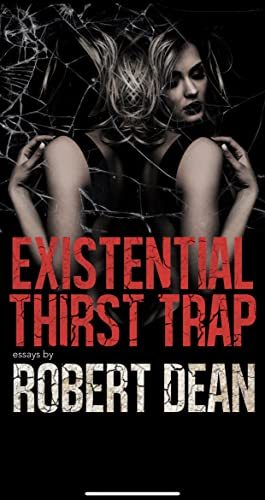
View On WordPress
#book#book blog#book review#collection of essays#coming soon#essays#existential thirst trap#humor#life#lifestyle#literary review#literature#parenting#robert dean#satire#social commentary
0 notes
Text
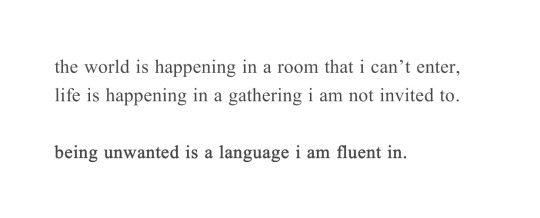
fatima aamer bilal, from being unwanted is a language.
[text id: the world is happening in a room that i can't enter, life is happening in a gathering i am not invited to. / being unwanted is a language i am fluent in.]
#fatima aamer bilal#poetry#poeticstories#literature#art#poetic#book quotations#writing#words words words#yearning#longing#fantasy#book review#literary#franz kafka#taylor swift#bts#sylvia plath#lana del rey#mahmoud darwish#life crisis#self loathing#poem#prose#dark poetry#dark academia#typography#fiction#spilled poetry#spilled quotes
4K notes
·
View notes
Text
My craft essay in the American Poetry Review!

Thrilled thrilled thrilled to hold the new American Poetry Review, which contains my craft essay On Giving Up! In every way a dream come true. Thank you Elizabeth Scanlon and the entire American Poetry Review crew!
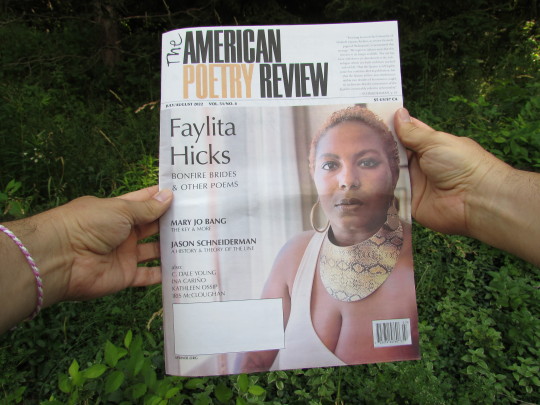
#Christopher Citro#poets on tumblr#writers on tumblr#american poetry review#On Giving Up#craft essay#writing essay#writing craft essay#prose#Citro#APR#the american poetry review#literary journal#literary magazine#literary review#creative writing#writing#reading
0 notes
Text
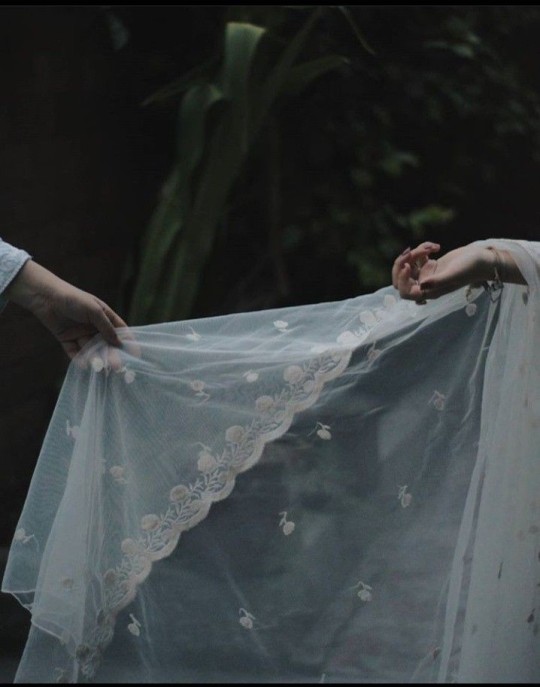

أنت ذلك الـ "لا شيء" عندما يسألني الناس عما أفكر فيه
You're that "nothing" when people ask me what I'm thinking about."
#literary quotes#books & libraries#dark acadamia aesthetic#dark academia#light academia#poetry#vintage#spilled thoughts#love poem#trending#bookstgram#books and reading#bookworm#book quotes#books#bookblr#books and literature#bookstagram#booklr#book review#comic books#pak dramas#korean drama#drama#kdrama#kafka#love quotes#lovers#love
388 notes
·
View notes
Text
The Power and Pitfalls of Anthropomorphism in Literature and Media
“Long, blue, spiky-edged shadows crept out across the snow-fields, while a rosy glow, at first scarce discernible, gradually deepened and suffused every mountain-top, flushing the glaciers and the harsh crags above them. This was the alpenglow, to me the most impressive of all the terrestrial manifestations of God. At the touch of this divine light, the mountains seemed to kindle to a rapt,…
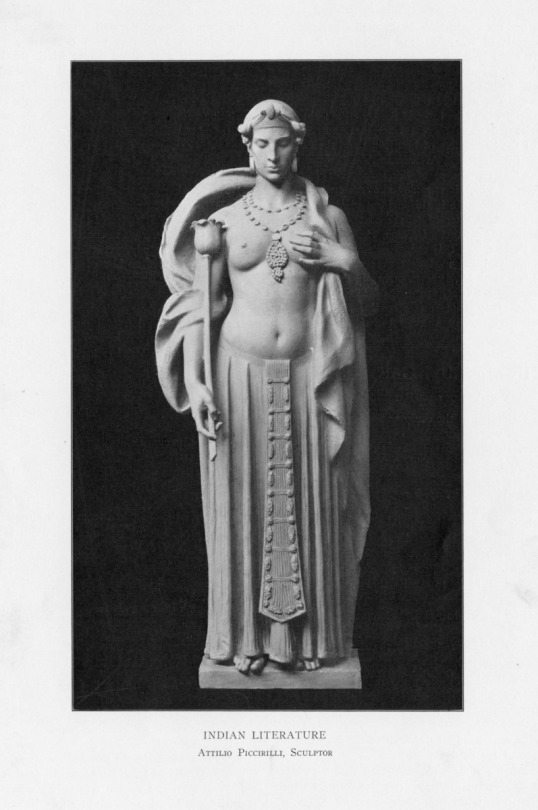
View On WordPress
#american history#american literature#anthropomorphism#anthropomorphology#history#literary review#literature#storytelling
0 notes
Text
Okay I need to rant about Glass Onion for several paragraphs
WARNING: SPOILERS!
Glass onion is phenomenal, and I personally enjoyed its themes more than the first Knives Out movie.
Now don’t get me wrong, Knives Out is arguably the better film, but its strengths lie in the complexity and brilliant execution of its core mystery. It’s a fantastic self-contained story about a shitty rich family and the people they directly affect. The members of the family range across the political spectrum and all express different ideologies, but the moment a migrant working-class woman has a legitimized shot at their inheritance they band together to prevent her from improving her life. It's interesting commentary on how wealthy people can talk a big game about helping others and being good people, but ultimately fall morally short when such actions threaten what they feel they “rightfully deserve.” But that's arguably the limitation of the film as its focus is entirely on the interpersonal conflict between the Thrombey family and Marta.
Glass onion isn’t limited by that.
The entire thematic core of Glass Onion concerns the damage that the rich and powerful can do to the world if they aren’t supervised, criticized, or limited.
Aside from our lovely detective Benoit Blanc, the murdered Andi Brand, and her twin sister Helen, all of the characters are shitty people that are damaging the world in a uniquely horrible way as a direct consequence of the unchecked power and wealth they wield.
To start we have Governor Claire Dubella. Her success in her political career has relied almost entirely on monetary support and influence from the films big bad and Elon Musk/Jeff Bezos analogue Miles Bron. Her platform has good objectives, and she’s passionate about hard topics like climate change, but her ability to act is entirely limited by the influence Miles has on her. If Miles wants her to do something, she feels like she has no choice but to, which results in her greenlighting an experimental powerplant that Miles wants built to advocate for his new fuel source. It’s untested technology, it’s volatile and dangerous as fuck, and Claire feels like she has no choice but to go along with it because if she doesn’t Miles will withdraw support from her career, or worse, support her opponents. She likens it to selling her soul, and it really is. She willingly undermined the health of her constituents for the sake of saving her career, and the shitty part is that Miles only controls her because she lets him. She could deny the power plant, or leave Miles, at any time, but she doesn’t because she perceives the personal risk as to great. She is a politician that won’t stand up for the people she represents, and no one calls her out on it.
Next, we have Duke Cody, the Alpha male men’s rights streamer who is just like, the absolute worst person in this film. His views and opinions are incredibly toxic, his actions and beliefs directly hurt the people he influences through the hurtful products he promotes, and thanks to Mile's wealth and influence both he and his terrible, terrible, terrible opinions have official backing and some form of legitimacy. He’s almost the direct inverse of Claire, being someone who really shouldn’t have support, but is getting it anyway because he’s Mile’s friend. And because Miles doesn’t care and is giving Duke support and helping him dodge legal trouble, he enables Dukes terrible opinions and lets them influence and hurt people.
Then we have Birdie, my personal favorite of the disruptors. She is a fashion designer, media star, and breathtakingly, beautifully, stupid. She’s not actively malicious like some of the other characters, but she is just so fundamentally incapable of thinking things through. When paired with her wealth and influence, this results in horrifying real-world consequences. She has her iconic fashion line of sweatpants made at the most infamous sweatshop in Bangladesh not because she doesn’t care, but because she thought a sweatshop is just a shop where you make sweatpants. She’s just very stupid, but at the very least has the decency to be aware of it. She even decides to own up to her Bangladesh mistake of her own volition, independent of the plot. The problem is that no one corrected for her, or guided her, or worked to influence her decisions. Miles just cared about what her brands could do for him and was perfectly willing to throw her under the bus to preserve his image.
Last of the four Disruptors is Lionel Toussaint. Not much to say about him actually, he’s fairly straightforward. He works directly under Miles as a scientist and is a parallel for the people that want to have confidence in tech ‘pioneers’ like Elon Musk. After all they’ve been successful, and things have worked out in the past, surely, we can give them leeway with new technology development. But there’s a reason why technology is prototyped and tested, and that’s because things always go wrong, and you need to take time and care to figure out how to ensure new technology is safe.
Which leads us to this asshole.
Miles goddamn Mona Lisa Burning Bron.
The absolute, motherfucking, shithead moron directly responsible for everything bad that happens in this film.
I lied about Duke Cody because this absolute buffoon is the actually the worst person in this film.
He manipulates politicians into endangering their constituents for his own gain, he enables the absolute worst and most toxic people by giving them legitimate platforms, he promotes influencers without caring for what their unchecked actions result in, and he deludes the people that work for him and want to believe in him with self-assured delusion. This man is arrogant, an indiscribable moron (worse than Birdie because at least she acknowledges her failings), dangerously delusional, obsessed with control, and most damning of all, unchecked.
Miles Bron is a direct look at how too much unchecked power, wealth, and influence results in unmitigated disasters. He doesn’t care about helping people, because he doesn’t take the time to make sure untested technology is safe for the public, handwaving legitimate concerns with denial and false assurance. He doesn’t care about his friends, because he murders two of them the instant, they become a threat to his control. He’s not smart, because all of his genius is the result of other people, he’s just skilled at advertising it as his own to get the credit. All he cares about is doing what he wants and being in control, because his opinion and self-worth and legacy is more precious to him than any other thing in the world. The man is a lie so absolute, so convoluted, and so stupidly straightforward that the slightest piece of truth will bring the facade of his existence crumbling down. And it’s hard to acknowledge something like that in the real world because someone that successful being that malicious and dumb sounds incredibly stupid. It’s an easy lie to buy because it’s more believable than how stupid the truth is.
Anyway, ultimately my conclusion is that we see a strikingly accurate portrayal of Jeff Bezos and Elon Musk in this film, and it was very cathartic seeing their hopes, ambitions, and house burn down around them. Because billionaires like them are shithead morons that lie to and manipulate everyone, and their arrogant and harmful self-delusions compound through the people they manage to influence.
Thanks for coming to my Ted Talk.
#knives out#glass onion#benoit blanc#film#mystery film#movie review#elon musk#jeff bezos#Need a hard kick in the nuts#literary analysis#movies#netflix#eat the fucking rich#can't believe a murder mystery radicalized me#rambling
1K notes
·
View notes
Text
My review of “sweat” By Zora Neale Hurston
Zora Neale Hurston was known to be very pragmatic about life. Since she was a kid, she knew that hard work was essential to a good and fulfilled life. She also believed in telling her truth no matter what other people had to say, mainly the men she encountered in her lifetime. When they offered help, she accepted it, yet kept her authenticity in her writing no matter the outcomes. In her short story “Sweat,” I can see the bits and pieces of her in the fictional character Delia, whom, despite all her ordeals, is always able to fend and stand up for herself. In this story, Hurston creates a character who not only challenges the gender expectations put on women in society, she also utterly resists them. By relying entirely on herself throughout the story even though she’s a married woman, Delia shows that she’s able to provide for herself in all the areas where her husband cannot (will not). Meanwhile the power of the husband as the man in the relationship is totally diminished by his abusive actions towards his wife, which completely goes against the idea that men must be the safeguards of their women or family. Hurston uses a reversal method to show that women can have strong will and be hard working while men can be the opposite. By allowing Delia to find a way through her traumatic experience, she completely shatters all societal expectations about gender roles in a relationship or marriage.
One of the biggest expectations put on women in society, for the most part, married women is to stay at home and to take care of the family and to let the husband be the provider and bring the money on the table. This concept is one of the oldest and most widely accepted societal ideologies among humans. Yet in “Sweat,” Delia is not even given such a choice. With an absent and abusive husband, she has to go out there and provides for herself on her own. The first scene in the story is an interaction between Delia and her husband that sort of gives an introduction to their marriage and their characters, and also what they represent. He says to her, “ Ah don’t keer if you never git through… Don’t gimme no lip either, else ah’ll throw’ em out and put mah fist up side yo’ head to boot”(1023). This Is a vivid depiction of how poorly he treats her. But this passage is to show that he abuses his power to control his wife. Hurston does not specifically say in the text that Syke is a terrible person, but everything he does discredits him and takes away his true power as the masculine figure in the relationship. That’s also when Delia finally stands up to him for the first time which leaves him surprised. The story describes her “poor body” (1023) and her “bare knuckle hands” (1023), a representation of not only her tiredness, and loneliness, but also of her hard work. Even though her husband tells her to quit washing “white folks clothes on the sabbath, “and then threatened to throw them all away one day, Delia always keeps working, which identifies her as the provider in the home as well. When she stands up to him, she says “Lookah head, Sykes, you done gone too fur. Ah been married to yuh for fifteen years, and Ah been takin in washin for fifteen years. Sweat, sweat, sweat! Work and sweat, cry and sweat, and pray and sweat” (1023). The vulnerability of her words is such a demonstration of how much strength she has culminated and what she has been through mentally.
Notice the word “cry” in her previous statement. A subtle way to point out the effects pf her marriage on her. With all the expectations society put on women, they fail to realize the mental hold that ought to have on them. To emphasize this idea, Hurston includes an interaction in the middle of the story between a group of men debating the situation between Delia and her husband. As she was riding around on her pony, delivering her washing, they talk about how unfortunate he must be for her to work so much with her husband’s refusal to provide for the both of them. “Yep…Hot or col’, rain or shine, jes ez regl’ar ez de weeks roll round’ Delia carries em’ an’ fetches ‘em on Sat’day” (1024) one of them says, to which the other one answers “She better if she wanter eat… Syke Jones aint wuth de shot an’ powder hit would tek tuh kill ‘em. Not to huh he ain’t” (1024). Here Hurston is trying to make a very interesting point. First, with the fact that this whole interaction is between men only, with most of them, arguing in favor of Delia and rightfully belittling Syke. Second, is the intention of the author to make the reader see Delia from a perspective other than her own, considering that Delia often thinks of herself in a very diminutive way. For these men, Delia is the ideal woman who found herself trapped in an unhappy marriage with a very problematic partner, they talk of her as being very “pritty” (1024) once and praise her for putting up with all of that for years. However, never did they mention that she should get out of it, or even offered to help her. The entire town is watching this unfold, and none of them raise a finger to help. And again, Hurston does not specifically blame anybody for what is happening, but she is showing how society often allow men to take advantage of women, even though they know it’s wrong. The same thing happened when Syke brought the snake home, they knew Delia feared it, yet chose to gossip about it instead of helping her get rid of it.
To continue the idea of the emotional hold of marriage on women, let’s go back to the beginning of the story, where she is lying awake thinking about what her marriage was like in the beginning. “Anything like flowers had long been drowned in the salty stream that had been pressed from her heart. Her tears, her sweat, her blood. She had brought love to the union, and he had brought a longing after the flesh” (1023). This part of story is the exact moment where Delia realizes that she gave so more much than what she received. And that the whole time she stayed in that marriage regardless of all the abuse, she in fact deserved better. There’s a lot of blame and shame in this part of the text. Almost as if it’s her own fault. She blames her “knotty, muscled limbs, her harsh knuckly hands” (1023) as if in any way, she’s the reason why Syke does not cherish her the way he should. It is not the case of course, but oftentimes, women think there’s something wrong with them when they are the victim of an abusive partner, and even as Syke was taking his last breath, Delia couldn’t help but bear the weight of him one last time.
Through this text, Hurston uses Delia as an example for all women who feels pressured to stay in relationships in which they are not valued, while also praising them for pulling through and speaking up for themselves when they had to. Although Delia is a victim of her husband, the main lesson to keep from that story is the fact that she is not a typical “wife.” She rises in the face of her challenges, shattering any expectations placed on her in her wake.
Works Cited
Hurston, Zora Neale. Swear. Edited by Carol Oates et al., Oxford University Press, The Oxford Book of American Short Stories. Oxford: 1992.
This work is written, edited, and owned by me:Teri Jacques. Every word except the work cited is my own.
0 notes